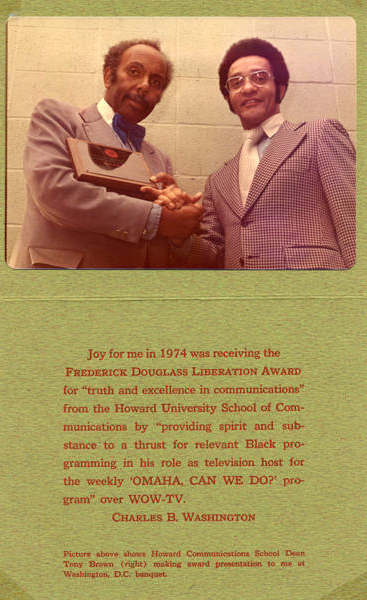Search the Blog
Categories
- Books & Reading
- Broadband Buzz
- Census
- Education & Training
- Friday Reads
- General
- Grants
- Information Resources
- Library Management
- Nebraska Center for the Book
- Nebraska Libraries on the Web
- Nebraska Memories
- Now hiring @ your library
- Preservation
- Pretty Sweet Tech
- Programming
- Public Library Boards of Trustees
- Public Relations
- Talking Book & Braille Service (TBBS)
- Technology
- Uncategorized
- What's Up Doc / Govdocs
- Youth Services
Archives
Subscribe
Tag Archives: Black History Month
Book Club Spotlight – The Legend of Bass Reeves
This year’s theme for Black History Month, chosen by the Association for the Study of African American Life and History, is “African Americans and Labor”. Today’s Book Club Spotlight by author Gary Paulsen takes a well-deserving look at a Black man who not only served his community faithfully through his work but excelled far above his station. ALA Notable Book and One Book for Nebraska Teens 2017, The Legend of Bass Reeves, is at once a historical fiction novel and historical fact. Known for his outdoor adventure novels, Paulsen writes vignettes based on the life of Bass Reeves, interspersing them with historical background, making the case for Reeves to be the one true hero of the West.
An illiterate runaway slave, Bass Reeves was the true, unknown icon of the Western Frontier. Despite facing down the barrel of a gun countless times, he was never injured, and he never shot first. Having daringly escaped slavery at 17, Bass lived free in the lawless land of Indian Territory- run by gangs and thieves. After saving one of their own from wolves, he finds companionship and family with the Muscogee Creek people for over 20 years. Never one to slow or turn down a challenge, at the age of 51, Reeves took up the badge and became the most successful and feared Deputy Federal Marshal of the West, his life story rivaled only by the fictional Lone Ranger.
“They could kill him, but they’d never own him again.”
-Gary Paulsen
For readers 10 and up, The Legend of Bass Reeves is a mostly fictional account of the real man. Unfortunately, as an illiterate former slave, Reeves did not keep any journals, and not much was written about him while he was alive. Paulsen sets out to right some of this wrong, pulling Reeves from obscurity. For his young audience, Paulsen wanted to give the unstoppable and honorable Bass Reeves his due instead of the outlaws like Billy the Kid and Butch Cassidy. The Legend of Bass Reeves, while about the heroic man, also delves into the lawless West, from the makeup of the land, the communities, and the treatment of Black and Native peoples in an accessible way for young readers to understand and any Book Club Group to discuss the finer points of.
If you’re interested in requesting The Legend of Bass Reeves for your book club, you can find the Request Form here. There are 11 copies. (A librarian must request items)
Paulsen, Gary. The Legend of Bass Reeves. Random House. 2006.
Posted in Books & Reading
Tagged Black History Month, book club spotlight, books, Reading
Leave a comment
Throwback Thursday: Christmas Card with Picture of Charles B. Washington & Tony Brown
Happy Black History Month #ThrowbackThursday!
The inside of this 5-1/2″x8-1/2″ 1974 Christmas greeting card has a color photograph of Tony Brown presenting the Fredrick Douglass Liberation Award to Charles B. Washington. Washington is holding the award as Brown shakes his hand. Written inside is:
Joy for me in 1974 was receiving the Frederick Douglass Liberation Award for “truth and excellence in communications” from the Howard University School of Communications by “providing spirit and substance to a thrust for relevant Black programming in his role as television host for the weekly ‘Omaha, Can We Do?’ program” over WOW-TV.
Charles B. Washington
Picture above shows Howard Communications School Dean Tony Brown (right) making award presentation to me at Washington, D.C. banquet.
This image is published and owned by the Omaha Public Library, who’s collection includes early Omaha-related maps dating from 1825 to 1922, as well as over 1,100 postcards and photographs of the Omaha area, as well as the Charles B. Washington Collection which is comprised of items relating to the life of Washington, a local civil rights activist.
See this collection and many more on the Nebraska Memories archive!
The Nebraska Memories archive is brought to you by the Nebraska Library Commission. If your institution is interested in participating in Nebraska Memories, see http://nlc.nebraska.gov/nebraskamemories/participation.aspx for more information.
Book Club Spotlight – Hector’s Bliss
A unique aspect of our Book Club Collection here at the Commission is our focus on Nebraska authors, settings, and stories, housing the hidden gems of Nebraska literature and history! Today’s pick for the Book Club Spotlight, in particular, focuses on a relatively unknown part of Nebraska’s Black History. While we know the story of white pioneers and homesteaders, there was also the incredible journey of formerly enslaved people who became landowners, farmers, and a community in the Sandhills. Hector’s Bliss: Black Homesteaders at Goose Lake, Nebraska, by Dennis Vossberg, is a historical fiction novel based on the incredible history of Black Homesteaders, who, under false pretenses, persevered in the harsh farmland until drought and the Dust Bowl overcame the whole region.
In the late 1800s, at the height of legalized racial segregation, just south of O’Neil, Nebraska, there was the short-lived story of Bliss, and the Black community members who called it home. During the economic downturn caused by the end of the Civil War, the newly freed people were looking for a reliable place to land. As newly married Hector and Julia Dixon were floundering in a small mining town, land promoters arrived, falsely promising flourishing farmland and untapped coal veins awaited them in the far reaches of the Nebraska Sandhills. The Dixons and 13 other families unknowingly move to the desert-like plains to start anew. Besought by harsh conditions, poverty, and rural isolation, their community works hard to create a solid foundation for the future despite the conditions. As one of the more educated residents, Hector Dixon finds himself wearing many hats in Bliss, as a farmer, the integrated school’s teacher, the justice of the peace, and eventually a milk road delivery man, all to support his growing and tenacious family. Striving to find a balance between the life his children dream of and the one he has worked so hard to build.
He took a lingering gaze over the peaceful countryside, thinking of how transient were the human inhabitants of this land, and how triumphantly enduring was the land itself
Dennis Vossberg
Hector’s Bliss is a moving historical fiction crafted with love and respect for the subjects, and Book Club Groups will find value in learning about this little-known Nebraska history. They may even be encouraged to learn more. Covered in the Nebraska Public Media story, “Looking for Bliss,” the story of the Dixons and Bliss is virtually unknown. Hector’s Bliss brings to light Black history that has been erased from cultural memory, revealing a more full and beautiful world. We won’t really ever know how the Black Homesteaders were treated by their white compatriots as those details have been lost to time. So, while prejudice and racism are addressed, Vossberg chooses to focus the limited peril on the indomitable human spirit and the life these people worked to build after slavery.
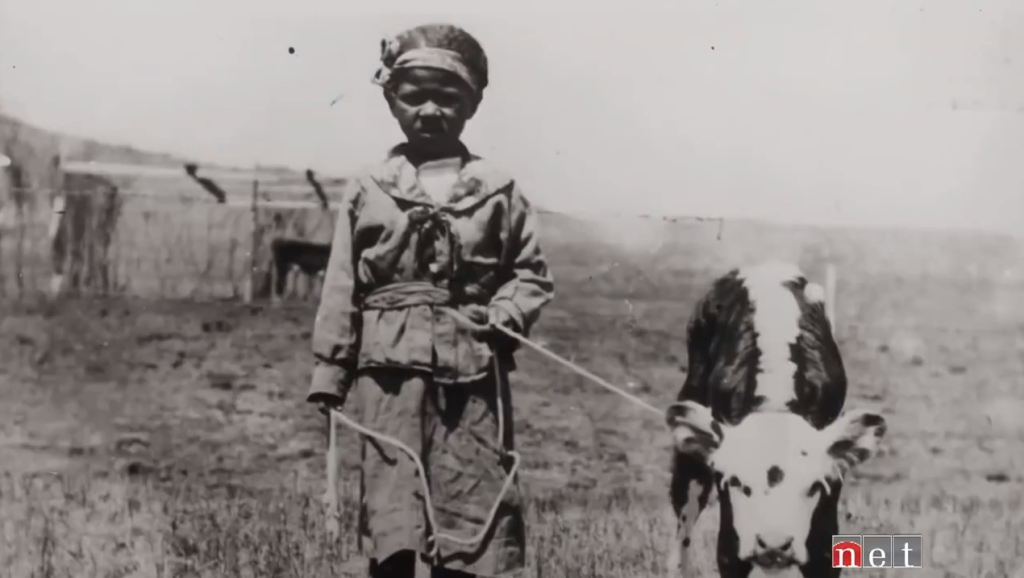
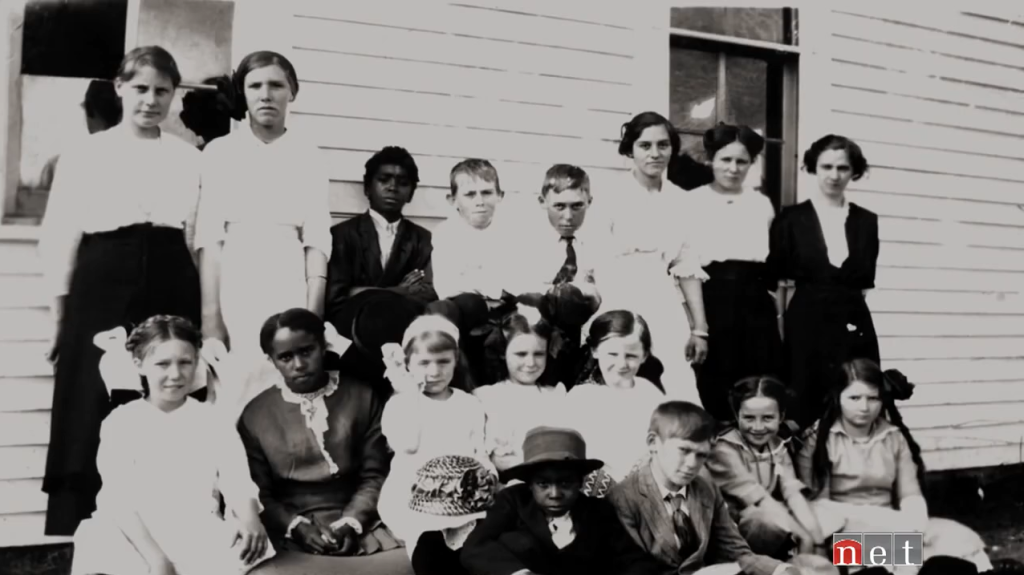
If you’re interested in requesting Hector’s Bliss for your book club, you can find the Request Form here. There are 4 copies available. (A librarian must request items)
Vossberg, Dennis. Hector’s Bliss. Morris Publishing. 2006
Posted in Books & Reading
Tagged Black History Month, book club spotlight, books, Nebraska History, Reading
Leave a comment
Throwback Thursday: African American Orchestra
Happy Black History month from Nebraska Memories, here’s another #ThrowbackThursday for you!
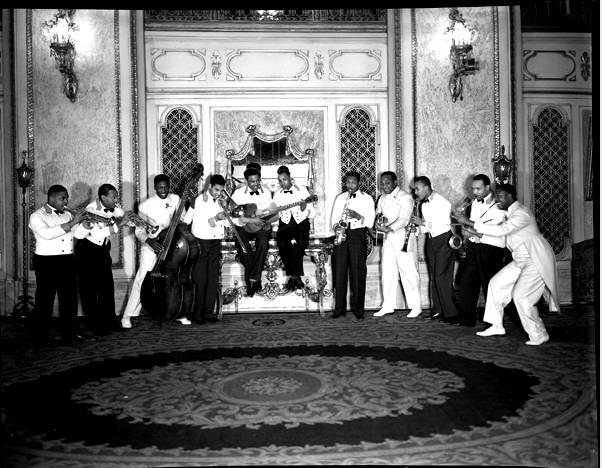
Dated December 8th 1937, this 8 x 10 acetate negative shows an orchestra of African American men playing at the Orpheum Theatre in Omaha, Nebraska. There are ten men playing a variety of instruments all being led by their conductor and his baton.
This image is published and owned by The Durham Museum and is part of the William Wentworth collection. The collection contains over 4000 photo negatives depicting life in Omaha, Nebraska from 1934 – 1950.
See this collection and many more on the Nebraska Memories archive!
The Nebraska Memories archive is brought to you by the Nebraska Library Commission. If your institution is interested in participating in Nebraska Memories, see http://nlc.nebraska.gov/nebraskamemories/participation.aspx for more information.
Book Club Spotlight – When Stars are Scattered
Happy Black History Month from Book Club Spotlight! The theme for 2024 is “African Americans and the Arts,” which honors the incredible contributions of African Americans to culture, music, art, and literature. And what better combination of art and literature is there than graphic novels? So, to wrap up our mini-series, we will follow young Somali refugees displaced by civil war. Where the Stars are Scattered, by Victoria Jamieson and Omar Mohamed, is based on the childhood of Mohamed, who grew up in Dadaab, the world’s largest refugee camp. The list of honors for this book is massive, including being a National Book Award Finalist, the School Library Journal Best Book of 2020, and a 2021-22 Golden Sower Chapter Book Nominee.
Omar and his brother Hassan have been in the Dadaab refugee camp for seven years! Without their parents, the boys live on their own, watched over by an aging foster mother, Fatuma. Having the responsibility of caring for himself and his nonverbal brother, everyday Omar must clean the floorless tent they sleep on, hide any valuables from thieves, and wait. Wait for water, wait for food, wait for his mother to find them, wait for the war to end, and wait to leave the refugee camp. When Omar gets a chance to attend school, he is far behind other children his age, and soon, the pressure of school and chores begins to make him angry and resentful. As he grows and becomes continually frustrated with his situation, he sees how everyone else is stuck just like him—especially the girls, who, like Omar, are burdened with too many responsibilities. With encouragement from his friends and community, Omar grows more confident in his abilities and in Hassan and starts dreaming about a future outside the camp. And one day, Omar’s and Hassan’s names are called for an interview with the UN for a chance to finally leave Dadaab, an exciting and terrifying possibility.
“It was nice talking like this. Pretending we were normal kids, with normal futures to look forward too”
– Victoria Jamieson & Omar Mohamed
Written for middle grades and up, all will be deeply moved by reading this graphic novel. With wars waging worldwide, it’s hard not to feel overwhelmed and powerless, and listening to stories of those going through these tough times matters. When Stars are Scattered is an excellent representation of the day-to-day life in refugee camps. Maybe your Book Club Group wants to learn more about what life is like for refugees, or your students have questions about what is happening to displaced children like them. Since moving to America, Mohamed has dedicated his life to serving his community back in Dadaab and improving the living conditions of refugees, especially young girls through his nonprofit foundation, Refugee Strong.
“Please take away from the reading of this book an understanding that you should never give up hope. In the camp, we were given courage by our faith to always be patient and to never lose hope. Things may seem impossible, but if you keep working hard and believe in yourself, you can overcome anything in your path. I hope my story will inspire you to always persevere.”
Omar Mohamed
If you’re interested in requesting When Stars are Scattered for your book club, you can find the Request Form here. There are 10 copies available. (A librarian must request items)
To see more of our Black Voices book club titles, visit here.
Jamieson, Victoria & Mohamed, Omar. When Stars are Scattered. Penguin Random House. 2020
Posted in Books & Reading
Tagged Black History Month, book club spotlight, books, Reading
Leave a comment
#BookFaceFriday – “Black Print with a White Carnation” by Amy Helene Forss
#BookFaceFriday celebrates Black History Month!
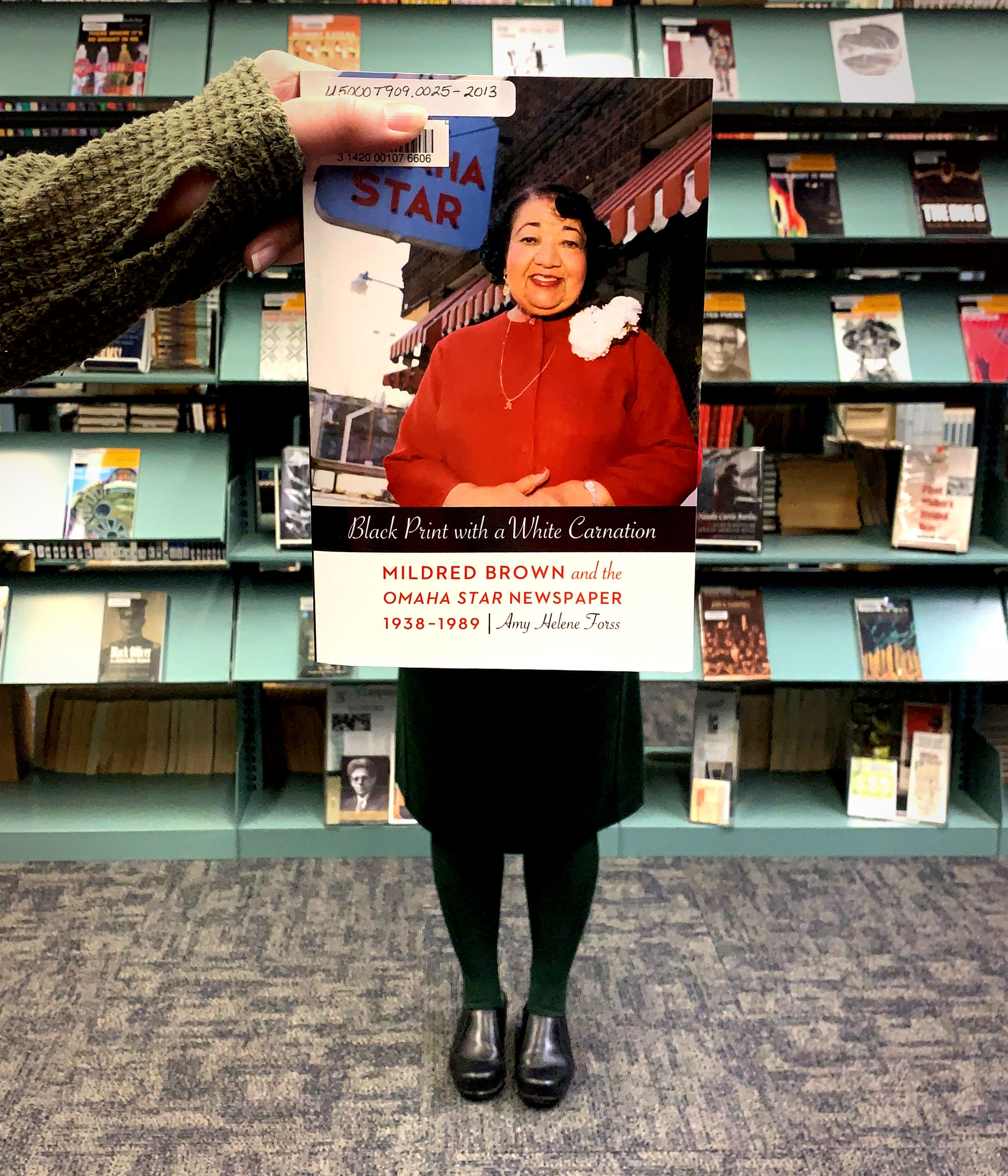
Extra, extra, read all about it with this week’s #BookFaceFriday, “Black Print with a White Carnation: Mildred Brown and the Omaha Star Newspaper, 1938-1989” by Amy Helene Forss (University of Nebraska Press; Illustrated edition, 2014.) You can find this title in the Nebraska Library Commission’s permanent collection; the Nebraska Publications Clearinghouse receives documents every month from all Nebraska state agencies, including the University of Nebraska Press (UNP). UNP books, as well as all Nebraska state documents, are available for checkout by libraries and librarians for their patrons. Find great reads to celebrate Black History Month in all of NLC’s collections, including Book Club Kits, and Nebraska OverDrive Libraries.
“In addition to its well-researched look at Brown’s career, the book provides an informative description of the history of black-owned newspapers in North America, going back to the founding in 1853 of the Provincial Freeman, an antislavery newspaper in Canada.” ―Omaha World-Herald
Love this #BookFace & reading? Check out our past #BookFaceFriday photos on the Nebraska Library Commission’s Facebook page!
Book Club Spotlight – Long Way Down

It’s our first Book Club Spotlight of Black History Month, which means this month, we’re showcasing books by incredible authors to celebrate Black Voices in literature. Today’s author, Jason Reynolds, is the recipient of awards such as the NAACP Image Award and multiple Coretta Scott King honors and was the 2020-2022 National Ambassador for Young People’s Literature. Reynolds encourages us not to see the genre of YA as limiting, enjoying the freedom of emotion young people carry to tell good stories. Today’s spotlight, recipient of the Printz and Newbery Honors, Long Way Down, is written in free verse, through snippets of dreams and recollections, as a young boy is visited by the ghosts of his past.
After witnessing his brother’s murder, Will knows what he has to do. Follow The Rules.
1) Don’t Cry 2) Don’t Snitch 3) Get Revenge.
He doesn’t know who created The Rules and when, but he does know that it’s his duty to follow them. Because he knows, or at least he thinks he knows, who killed Shawn. Will finds his brother’s hidden gun, gets on the 8th-floor elevator and presses L. As Will goes further down the elevator, he is visited by those who are gone because of the same Rules he is now going to follow, and he is given a chance to either continue the cycle or break it apart.
“MY MOTHER USED TO SAY
Jason Reynolds
I know you’re young,
gotta get it out
but just remember, when
you’re walking in the nighttime,
make sure the nighttime
ain’t walking into you.”
For ages 12 and above, Long Way Down skillfully employs free verse to weave together an unforgettable story about the cycle of violence, especially in how it affects urban and Black communities. Reynolds prefers not to shy away from realism and challenging topics in his novels because the kids reading them have experienced or will experience the same situations in real life. Reynolds, himself, almost fell victim to the cycle when he was younger, and he uses his real-life experiences and emotions to cut to the core of why violence like this continues to happen. Much like Will’s elevator ride that only takes sixty seconds, but lasts a whole novel, reading Long Way Down, can be taken at whatever pace is comfortable to the reader’s skill level. And as violence in schools continues to be a constant fear, there will be plenty for young reading groups to discuss as the floors tick by.
If you’re interested in requesting Long Way Down for your book club, you can find the Book Club Kit Request Form here. There are 10 copies available (Items must be requested by a librarian)
To read more by Jason Reynolds, check out his Track Series, or, The Boy in the Black Suit (One Book For Nebraska Teens 2019).
Reynolds, Jason. Long Way Down. Atheneum. 2017.
Posted in Books & Reading
Tagged Black History Month, Black Voices, book club spotlight, books, Reading
Leave a comment
#BookFaceFriday – “Furious Cool” by David Henry and Joe Henry
#BookFaceFriday celebrates Black History Month!
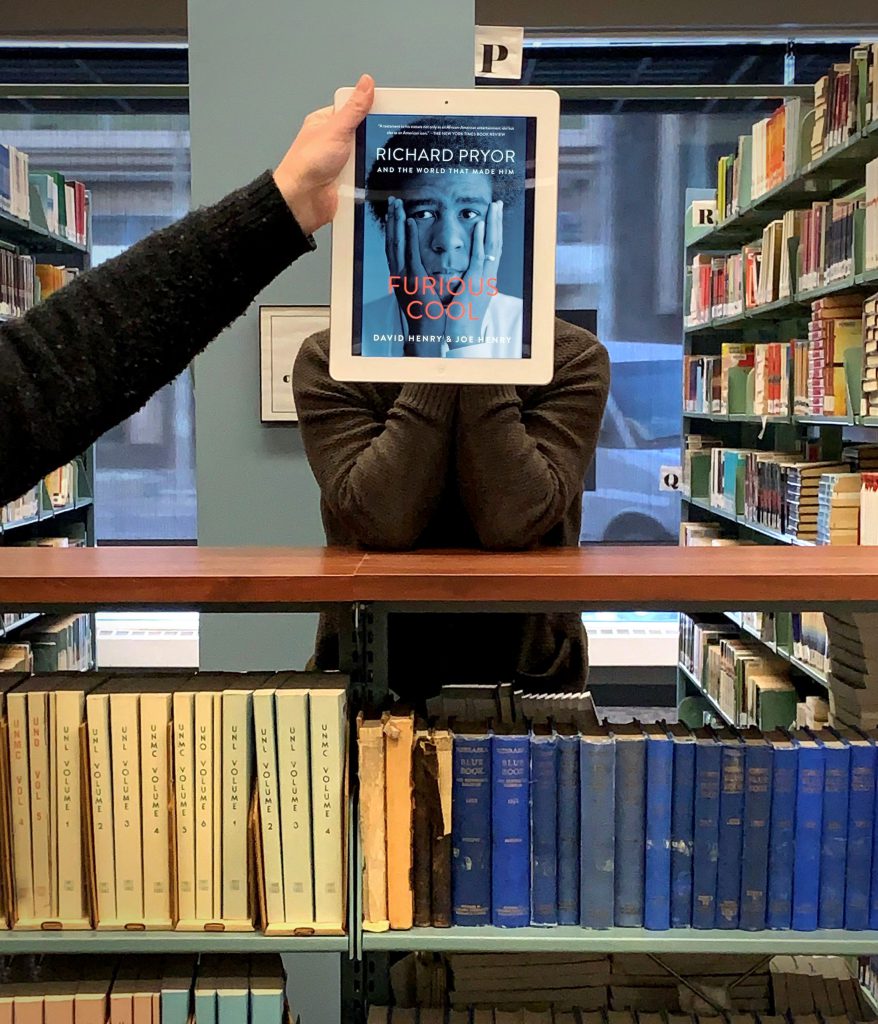
Laugh and cry with this week’s #BookFaceFriday, “Furious Cool: Richard Pryor and the World that Made Him” by David Henry and Joe Henry (Workman Publishing, 2013.) You can find this title in the Nebraska OverDrive Libraries curated collection “Black Voices and Black History,” created to help users find great reads to celebrate Black History Month. Its 195 titles consist of literature, fiction, nonfiction, autobiographies, and biographies.
“Richard Pryor lives again in the pages of Furious Cool by David and Joe Henry. With heart and grace and witnessing, they show us how and why this comic and tragic genius changed the culture of this country when he could not change himself. You may be meeting or rediscovering Pryor, but he’s likely to change you, too.” ―Gloria Steinem
Find this title and many more through Nebraska OverDrive. Libraries participating in the Nebraska OverDrive Libraries Group currently have access to a shared and growing collection of digital downloadable audiobooks and eBooks. 186 libraries across the state share the Nebraska OverDrive collection of 26,554 audiobooks, 32,935 eBooks, and 3,940 magazines. As an added bonus it includes 130 podcasts that are always available with simultaneous use (SU), as well as SU ebooks and audiobook titles that publishers have made available for a limited time. If you’re a part of it, let your users know about this great title, and if you’re not a member yet, find more information about participating in Nebraska Overdrive Libraries!
Love this #BookFace & reading? Check out our past #BookFaceFriday photos on the Nebraska Library Commission’s Facebook page!
Posted in Books & Reading, General
Tagged Biography, Black History, Black History Month, Black Voices, Book Covers, bookface, bookfacefriday, ebooks, nonfiction, OverDrive, Richard Pryor
Leave a comment
#BookFaceFriday “The Boy in the Black Suit”
Everybody’s crazy for a sharp-dressed #BookFace!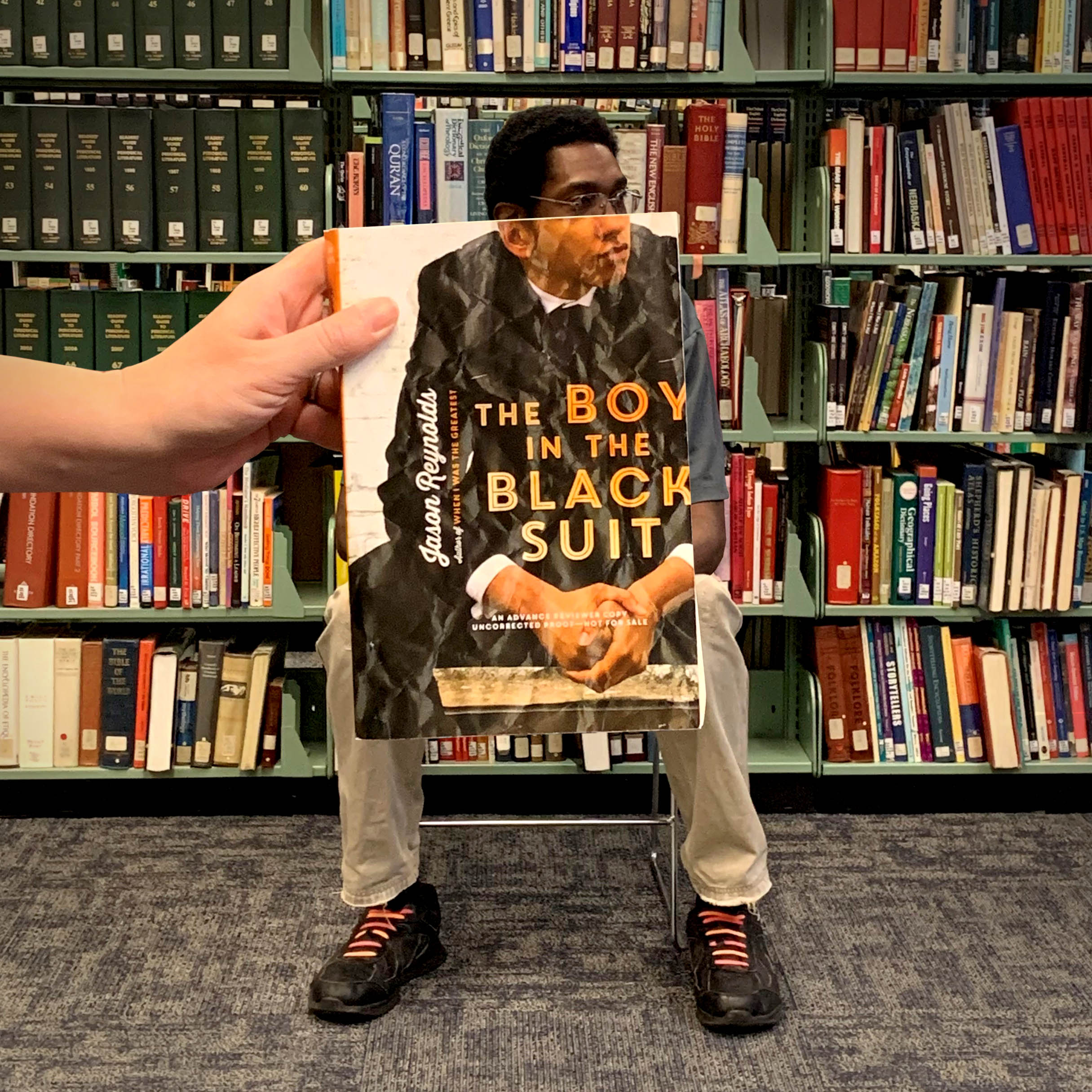
We’re throwing back to this #BookFace as we celebrate Black History Month. The author, Jason Reynolds, was recently selected as the National Ambassador for Young People’s Literature by the Library of Congress! We highly recommend “The Boy in the Black Suit” by Jason Reynolds (Atheneum Books for Young Readers, 2015.) Not only was it the 2019 One Book for Nebraska Teens selection it’s also available as a part of the NLC Book Club collection. This excellent YA novel is also a 2016 Coretta Scott King Author Honor book. You can reserve this kit today for your youth book club!
This week’s #BookFace model is one of our Commissioners, Vernon J. Davis! He began his three-year term as Commissioner this past July after his appointment by Governor Pete Ricketts.
Love this #BookFace & reading? Check out our past #BookFaceFriday photos on the Nebraska Library Commission’s Facebook page!
Throwback Thursday: Charles B. Washington with Jackie Robinson and Bob Boozer
We’re celebrating another week of Black History month with this week’s #ThrowbackThursday!
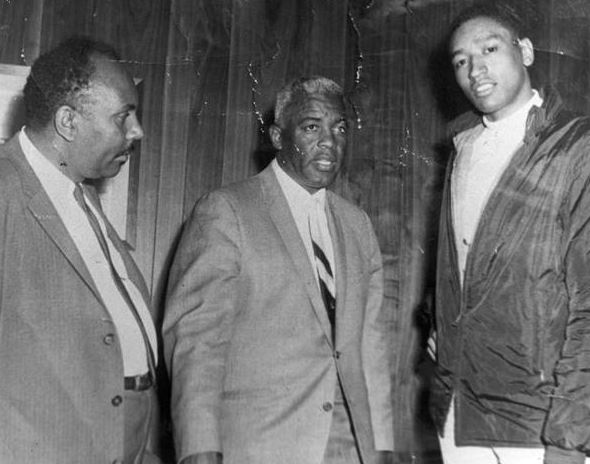
From Omaha, Nebraska, Charles B. Washington was a journalist, mentor, and activist. He is known for his work in the North Omaha area. On September 14, 1986, the North Branch of the Omaha Public Library was renamed after him.
Jackie Robinson, from Cairo, Georgia, broke racial barriers in professional athletics when he became the first African American to play Major League Baseball.
Bob Boozer was an Omaha native who played for Tech High. He went on to play for Kansas State University and became the number one draft pick of the NBA’s Cincinnati Royals in 1959.
This 10″x8″ black and white photograph is published and owned by Omaha Public Library. The items published by Omaha Public Library in Nebraska Memories include early Omaha-related maps dating from 1825 to 1922, as well as over 1,100 postcards and photographs of the Omaha area.
Nebraska Memories is a cooperative project to digitize Nebraska-related historical and cultural heritage materials and make them available to researchers of all ages via the Internet. Nebraska Memories is brought to you by the Nebraska Library Commission. If your institution is interested in participating in this project, see http://nlc.nebraska.gov/nebraskamemories/participation.aspx for more information.
#BookFaceFriday – “The Autobiography of Malcolm X”
#BookFaceFriday celebrates Black History Month!
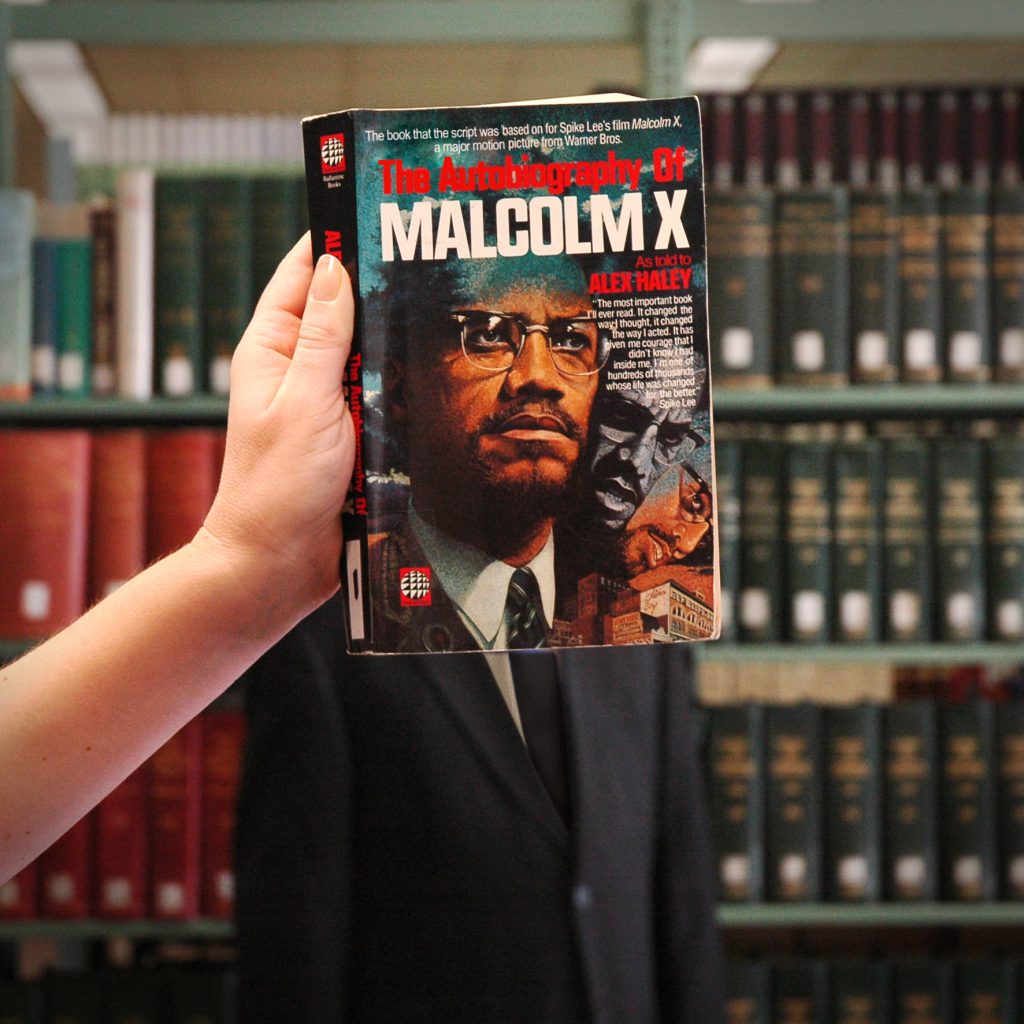
We’re throwing back to one of our first-ever #BookFace photos with “The Autobiography of Malcolm X: As told to Alex Haley” by Malcolm X (Grove Press, 1963.) We originally featured this title as a Nebraska 150 Books List selection, and it’s available in our book club kit collection. Check out this Nebraska Author of color for your book club!
“Malcolm X’s autobiography seemed to offer something different. His repeated acts of self-creation spoke to me; the blunt poetry of his words, his unadorned insistence on respect, promised a new and uncompromising order, martial in its discipline, forged through sheer force of will.”—Barack Obama, Dreams from My Father
“The most important book I’ll ever read, it changed the way I thought, it changed the way I acted. It has given me courage I didn’t know I had inside me. I’m one of hundreds of thousands whose lives were changed for the better.”—Spike Lee
Love this #BookFace & reading? Check out our past #BookFaceFriday photos on the Nebraska Library Commission’s Facebook page!
Posted in Books & Reading, General
Tagged Autobiography, Black History Month, Book Club Kits, Book Covers, bookface, bookfacefriday, Malcolm X, nonfiction
Leave a comment
Throwback Thursday: Charles B. Washington and Louis Armstrong
The month of February is Black History Month and we’re celebrating with this week’s #ThrowbackThursday!
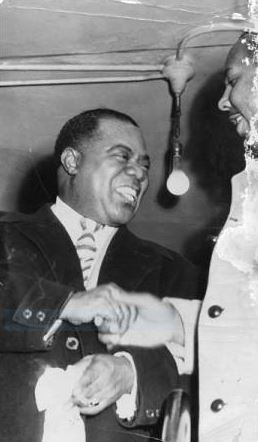
In this 5-3/4″ x 10″ black and white photograph, Nebraska’s own civil rights activist Charles B. Washington is shaking hands with Louis Armstrong, one of the most influential figures in jazz history.
This week’s image is provided and owned by Omaha Public Library. The items on the Nebraska Memories archive include early Omaha-related maps dating from 1925 to 1922, as well as over 1,000 postcards and photographs of the Omaha area.
Are you interested in Nebraska history? If so, check out all the collections on the Nebraska Memories archive!
Nebraska Memories is a cooperative project to digitize Nebraska-related historical and cultural heritage materials and make them available to researchers of all ages via the Internet. Nebraska Memories is brought to you by the Nebraska Library Commission. If your institution is interested in participating in this project, see http://nlc.nebraska.gov/nebraskamemories/participation.aspx for more information.

